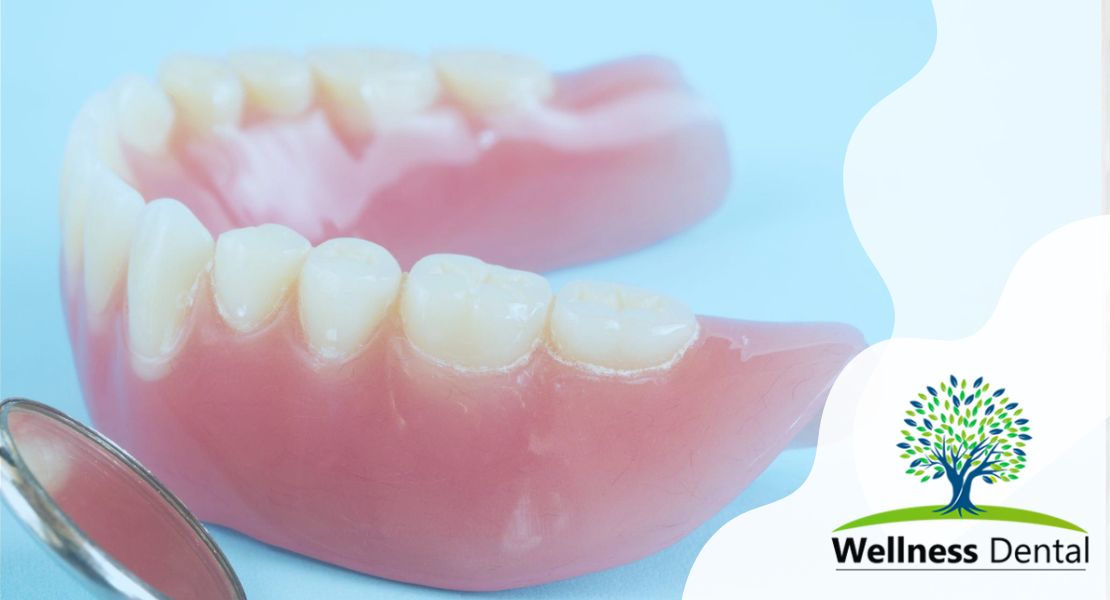Temporary dentures are a type of denture that is used to replace missing teeth for a period of time. Also known as immediate dentures, they are designed to be worn while waiting for permanent dentures to be fabricated. Temporary dentures are often recommended following a tooth extraction or oral surgery to help maintain the shape of the gums and provide the patient with the ability to eat and speak normally.
Temporary dentures come in two variations: complete and partial. Complete dentures are utilized to replace an entire set of teeth, while partial dentures are used to replace one or more teeth. Temporary dentures are typically made from a mold or impressions of the patient’s remaining teeth and gums.
During the healing process, the gums and bone tissue may shrink or change shape, which can affect the fit of the dentures. As a result, frequent adjustments and relines may be necessary to ensure a proper fit. Temporary dentures may also require extra care and maintenance compared to permanent dentures due to their temporary nature.
Although temporary dentures offer a convenient and affordable option for those in need of replacement teeth, they are not a long-term solution. Over an extended period of time, temporary dentures may become uncomfortable or start to damage the gum tissue. In these cases, a dental professional may recommend other dental options, such as dental implants, dental bridges, or traditional dentures.
Regardless of the type of denture chosen, proper care and maintenance are crucial for maintaining oral health. This includes practicing good oral hygiene habits, avoiding hard or sticky foods, and following post-operative instructions provided by the dental professional.
In summary, temporary dentures are a useful option for those needing replacement teeth for a period of time. While they require frequent adjustments and may not be a long-term solution, they offer a practical and affordable option for those in need. Consult with a dental professional to determine if temporary dentures are the right choice for you.
Temporary Dentures Timeline and Process

When it comes to replacing lost teeth, temporary dentures can be an excellent option. These prosthetic devices are designed to be worn for a period of time while the gums heal and the patient prepares for a more long-term solution, such as permanent dentures or dental implants.
But what exactly is the timeline and process for getting temporary dentures? Let’s take a closer look.
First, it’s important to note that the timeline for temporary dentures will vary depending on the patient’s individual circumstances. Factors like the number of teeth being replaced, the type of dentures needed, and the patient’s overall oral health will all impact the timeline.
That being said, here’s a general overview of what you can expect:
- 1. Consultation and Preparation
The first step in getting a temporary denture is to schedule a consultation with a dental professional. During this appointment, the dentist will evaluate your oral health and determine whether temporary dentures are the right option for you.
If they determine that temporary dentures are appropriate, they will take impressions of your mouth and prepare for the creation of your denture.
- 2. Creation of Temporary Denture
Once your impressions have been taken, they will be sent to a dental laboratory where your temporary denture will be created. This process can take several days or weeks.
The denture will be custom-made to fit your mouth and will typically include prefabricated teeth and acrylic materials.
- 3. Fitting and Adjustments
Once your temporary denture is fabricated, you will return to your dentist’s office for fitting and adjustments. The denture will be placed in your mouth and your dentist will make any necessary adjustments to ensure a proper fit.
During this process, you may experience some discomfort or sensitivity. It is important to communicate any concerns to your dental professional so that they can make adjustments as needed.
- 4. Healing and Maintenance
Once your temporary denture is in place, you will need to follow a strict maintenance routine to ensure the denture fits properly and your gums heal correctly. This may involve frequent adjustments or relines, as well as proper cleaning techniques.
It is important to be patient and take care of your oral health during this time. In some cases, you may need to avoid certain foods or stick to softer foods to prevent irritation or discomfort.
- 5. Transition to Long-Term Solution
Temporary dentures are designed to be a short-term solution. As your gums heal and your dentist prepares for a long-term solution, you will eventually transition to permanent dentures or another option such as dental implants.
Overall, the timeline and process for getting temporary dentures varies from patient to patient. Working closely with your dental professional to create a personalized treatment plan can help ensure the best possible outcome.
Cleaning and Care

Cleaning and Care for Temporary Dentures
After receiving temporary dentures, it is important to establish a thorough cleaning and care routine to maintain good oral hygiene and prolong the lifespan of the dentures. Here are some helpful tips for cleaning and taking care of your temporary dentures:
- 1. Remove and rinse dentures daily:
It is important to regularly remove your dentures and rinse them off to remove any food particles or debris. This will help to prevent bad breath and other oral health issues.
- 2. Brush dentures daily:
Using a soft-bristled brush and mild soap or denture cleaner, gently brush the surface of your dentures. Be careful not to scrub too hard or use hot water, which can cause the denture material to warp.
- 3. Soak dentures overnight:
To help keep your dentures clean and free of bacteria, soak them overnight in a solution of water and denture cleaning tablets.
- 4. Handle dentures with care:
Avoid dropping your dentures or handling them roughly, which can cause them to break or become damaged. Rinse them over a folded towel or sink filled with water to prevent damage if they are accidentally dropped.
- 5. Avoid hot beverages and foods:
Hot beverages and foods can cause the denture material to expand, which can cause discomfort and irritation. Allow hot beverages and foods to cool before consuming them.
- 6. Keep dentures moist:
When not in use, dentures should be kept moist to prevent them from drying out and becoming brittle. However, be sure not to soak them in hot water, as this can cause the material to warp.
By following these simple cleaning and care tips, you can help to keep your temporary dentures clean, comfortable, and last longer. If you experience any issues with your dentures, such as discomfort, irritation, or loose fit, be sure to contact your dental professional for assistance.
Temporary Denture Final Steps
After undergoing a tooth extraction or oral surgery, a dental professional may recommend temporary dentures as a replacement option. Temporary dentures, also known as immediate dentures, are a type of removable denture that are designed to be worn for a period of time while waiting for the gum tissue and jaw bone to heal.
Once the healing process is complete, the dental professional may recommend replacing the temporary dentures with permanent dentures or other dental options such as dental implants or a dental bridge. But before that can happen, there are a few final steps that need to be taken with the temporary dentures.
The first step is to schedule a follow-up appointment with the dental professional. During this appointment, the fit of the temporary dentures will be evaluated, and any necessary adjustments will be made. It is important to attend this appointment so that the temporary dentures fit properly and are comfortable to wear.
It is also important to practice good oral hygiene while wearing temporary dentures. This includes brushing the dentures daily to remove any food particles or debris, as well as rinsing them off after meals. Additionally, it is recommended to soak the dentures overnight in a solution of water and denture cleaning tablets to keep them clean and free of bacteria.
During the healing process, it is important to follow the post-operative instructions given by the dental professional. This may include avoiding hot beverages and foods, sticking to softer foods during the adjustment period, and practicing proper care of the extraction sites.
As the healing process progresses, it is possible that the gum tissue and jaw bone will shrink, resulting in a loose fit of the temporary dentures. In this case, a temporary reline material may be used to add extra material to the inside of the dentures to compensate for the shrinkage and improve the fit.
Overall, temporary dentures are a valuable option for those who have lost teeth due to severe tooth decay or other oral health issues. With proper care and maintenance, temporary dentures can help individuals maintain their oral health and prepare for more permanent dental options in the future.
The First 24 Hours
After Receiving Temporary Dentures
The first 24 hours after receiving temporary dentures can be a challenging time, but proper care and attention can ease the transition and ensure a successful healing process. Temporary dentures are usually provided after tooth extraction or oral surgery and are designed to replace missing teeth while the mouth heals. Here are some tips and guidelines to follow during the first 24 hours after receiving temporary dentures.
In conclusion, the first 24 hours after receiving temporary dentures can be challenging, but following these tips and guidelines can help ease the transition and ensure a successful healing process.
Remember to follow your dentist’s instructions, avoid hot food and drinks, stick to soft foods, rinse regularly, and be patient with yourself as you adjust to your new dentures.
The First Few Weeks
The first few weeks after receiving temporary dentures can be an adjustment period for many. During this time, it’s essential to be patient and take proper care of your teeth and gums. Temporary dentures are designed to replace missing teeth while the mouth heals, and they can be either partial or complete dentures, depending on your needs.
The first few weeks after receiving temporary dentures can be a bit of a challenge. You may experience some discomfort, especially during the first few days. This discomfort is normal and expected, and you may find that you need to adjust your diet to softer and easier-to-chew foods during this time. Remember to avoid hot and spicy foods as well as hard and crunchy foods that may irritate your gums or cause pain.
It’s also important to take good care of your dentures during the first few weeks. Your dentist or dental professional will give you specific instructions on how to care for your temporary dentures, and it’s crucial to follow these guidelines closely. Proper care will ensure that your dentures last longer and prevent any unwanted complications.
During the first few weeks, you may also need to visit your dentist or dental professional for adjustments to your temporary dentures. This is normal and expected, as your gums may shrink or adjust during the healing process. Adjustments to your dentures will help you achieve a more comfortable and secure fit, allowing you to speak and eat more easily.
Additionally, during the first few weeks, it’s important to schedule additional appointments with your dentist or dental professional for checkups and assessments. These appointments will allow your dental professional to monitor your healing progress and evaluate any additional treatment options that may be necessary, such as dental bridges or dental implants.
Finally, remember to be patient and allow yourself time to adjust. Temporary dentures require an adjustment period, and it may take several weeks or even months for you to feel comfortable and confident with your new teeth. Give yourself time, be patient, and follow the recommended guidelines for care and maintenance of your temporary dentures. In no time, you’ll be smiling and eating with confidence once again.
Pros of Temporary Dentures
Temporary dentures, also known as immediate dentures or provisional dentures, are a type of denture used to replace missing teeth in a cost-effective and timely manner. Although they are not intended to be a long-term solution, temporary dentures offer several advantages over other dental options. In this article, we will explore some of the pros of temporary dentures.
Affordable
One of the biggest advantages of temporary dentures is that they are typically more affordable than permanent dentures or other dental options. This makes them more accessible to those who do not have dental insurance or who cannot afford more expensive treatments.
Faster healing time
After tooth extraction, your jaw bone needs time to heal before implants or bridges can be placed. This healing process can take several months, during which time you will be without teeth. Temporary dentures, however, can be fitted immediately after extraction, allowing you to maintain both your smile and your ability to eat and speak normally.
Easy to fit
Temporary dentures do not require precision bite impressions or extensive customization, making them easier to fit than permanent dentures. This means that you can get your new teeth sooner and with less hassle.
Preserves gum tissue
Temporary dentures can help preserve gum tissue and prevent gum disease. They act as a barrier between your gums and potential irritants such as food particles and bacteria, which can cause gum inflammation and disease.
Flexible options
Temporary dentures are available in both partial and complete sets, allowing you to replace one or more missing teeth. This means that you can choose the type of denture that best suits your needs and budget.
In conclusion, temporary dentures offer a range of benefits for those seeking a cost-effective and timely solution to missing teeth. While they may not be as aesthetically pleasing or durable as permanent dentures, they offer short-term comfort, flexibility and affordability. If you are considering temporary dentures, make sure to consult with your dental professional to discuss your options and the proper care and maintenance of your new teeth.
Cons of Temporary Dentures
While temporary dentures have certain benefits, they also come with their own set of drawbacks. Here are some of the cons of temporary dentures that you should be aware of:
Frequent adjustments
As your gums heal and as your mouth adjusts to the new dentures, you may need to visit your dental professional frequently for adjustments. This can be time-consuming and inconvenient.
Limited functionality
While temporary dentures can restore your ability to eat and speak normally, they may not be as comfortable or functional as natural teeth or permanent dentures. You may need to stick to softer foods and avoid chewing gum or tough meats to prevent damage to your dentures.
Temporary solution
As the name suggests, temporary dentures are only meant to be a short-term solution until your gums have fully healed and you either receive permanent dentures or dental implants. This means that you may need to undergo another tooth extraction appointment once your temporary dentures are no longer needed.
Jaw bone shrinkage
When you lose teeth, your jaw bone can start to shrink over time. Temporary dentures can help prevent some of this shrinkage, but they cannot completely stop it. This can make it more difficult to fit permanent dentures or implants in the future.
Sensitivity and discomfort
While your gum tissue heals, you may experience sensitivity or discomfort when wearing your temporary dentures. You may need to use denture adhesives or relines to make them more comfortable.
Cost
While temporary dentures are typically more affordable than permanent dentures or dental implants, they still come with a cost. If you do not have dental insurance, this cost can add up quickly. In addition, any repairs or replacements may also come with additional expenses.
In conclusion, while temporary dentures can provide a useful solution for those who have lost teeth, they are not without their drawbacks. It’s important to consider both the pros and cons before deciding on the type of denture or dental treatment that best suits your needs.
What’s the lifespan of immediate dentures?
Immediate or temporary dentures are a common solution for those who have recently undergone tooth extraction or oral surgery. These dentures are designed to be a short-term, temporary option that provides an immediate replacement for lost teeth while the gums heal and you wait for permanent dentures or dental implants to be fitted.
But how long can you expect immediate dentures to last? The answer to this question depends on a few factors.
Firstly, the healing process for each individual is unique. While most people will require immediate dentures for a period of months while their gums heal and their mouth adjusts to the new dentures, some may only need them for a few weeks. Others may need to wear them for up to a year.
The type of dentures you receive also plays a role in determining how long they will last. Standard or traditional dentures typically have a lifespan of around five to seven years with proper care, while premium dentures may last up to ten years or more. Immediate dentures, being a temporary option, will not last as long as traditional dentures.
Proper care is also important in extending the lifespan of your immediate dentures. This includes proper cleaning and maintenance, as well as avoiding any foods or activities that could damage the dentures or cause discomfort.
In addition, the type of tooth extraction procedure you underwent can affect how long your immediate dentures will last. If you underwent a full-mouth extraction, your immediate dentures may need to be replaced more frequently than if you had only a few teeth extracted.
Overall, while immediate dentures are not intended to be a long-term solution, they can last for several months to a year with proper care and attention. To ensure the best possible outcome for your dental options, consult with a dental professional about the recommended period of time for your immediate dentures.
What is the cost of immediate (temporary) dentures?
If you are considering getting immediate dentures, one of the most important questions you may have is how much they will cost. The cost of temporary dentures can vary based on several factors, including the type of dentures, the location and experience of the dental professional, and the level of coverage provided by your dental insurance.
On average, you can expect to pay anywhere from $1,000 to $3,500 for immediate dentures. This is generally less expensive than permanent dentures, which can cost anywhere from $1,500 to $5,000 or more. However, it is still a significant investment that you should carefully consider before making a decision.
The type of dentures you choose can also impact the cost. Conventional dentures tend to be less expensive than premium dentures, as they require less customization and preparation work by the dental professional. Partial dentures can also be less expensive than full dentures, as they replace only some missing teeth rather than a full set.
It is important to note that dental insurance may cover some or all of the cost of immediate dentures. However, coverage varies widely by plan, so it is important to verify with your insurance provider what is covered under your specific plan.
In addition to the cost of the dentures themselves, there may be additional fees for services such as impressions, extractions, and adjustments. Some dental professionals may also offer cash discounts or payment plans to make the cost of immediate dentures more manageable.
Despite the cost, immediate dentures can be a worthwhile investment for those who need to replace missing teeth quickly and want to avoid the embarrassment of going without teeth during the healing process. It is important to discuss all your dental options with a dental professional and to carefully consider the cost and benefits before making a decision.
Who’s a good candidate for immediate (temporary) dentures?
When it comes to tooth extraction and tooth replacement, immediate dentures can be an excellent option for many patients. However, this type of denture may not be suitable for everyone. So, who is a good candidate for immediate dentures?
Firstly, those who are about to have a tooth extraction appointment would be the most obvious candidate. Immediate dentures can be made in advance and placed immediately after your teeth are extracted. This allows for quick restoration of your smile and prevents the embarrassment of being toothless.
Secondly, patients who have lost teeth due to severe tooth decay or gum disease may benefit from immediate dentures. This is because these dental issues can result in a loss of bone mass and density in the jaw. Immediate dentures can help to preserve some of this bone, which can be beneficial for future dental options like implant-supported dentures.
Patients with a strong gag reflex may prefer immediate dentures over traditional denture options. Since immediate dentures may eliminate the need for several visits to the dentist for tooth extractions and impressions, this can help reduce anxiety.
Immediate dentures can also be a good option for those who have previously worn dentures and need new ones. This is because the denture-making process can take some time and immediate dentures can be placed immediately after your teeth are extracted.
However, there are some cases in which immediate dentures may not be the best option. If a patient is experiencing significant bone loss or gum disease, it may be best to wait until the gums have healed before getting dentures. Additionally, some patients may require full-mouth extraction, which may require a more extensive healing period before dentures can be placed.
In conclusion, immediate dentures are a great option for many patients undergoing tooth extraction. In some cases, they can even serve as a temporary solution while waiting for more permanent dental options. To determine if immediate dentures are the best option for you, consult a dental professional who can advise based on your individual needs and dental history.
Preventing Tooth Loss
Tooth loss can be a common problem that affects people of all ages. It can be caused by several factors, including poor dental hygiene, tooth decay, gum disease, injury, and genetics. Losing teeth can not only affect your physical appearance but can also lead to a variety of dental and oral health problems.
One of the best ways to prevent tooth loss is by adopting good oral hygiene habits. Brushing your teeth at least twice a day and flossing regularly can help remove harmful bacteria and food particles from your teeth and gums. This can prevent tooth decay and gum disease, two leading causes of tooth loss.
Regular dental checkups and cleanings are also important for maintaining dental health and preventing tooth loss. A dental professional can detect early signs of dental problems and provide timely treatment to prevent further damage. They can also perform deep cleanings to remove hardened plaque and tartar buildup that can contribute to gum disease.
Using dental products like fluoride toothpaste and mouthwash can also help prevent tooth loss. Fluoride strengthens tooth enamel, making it more resistant to decay, while mouthwash can help kill harmful bacteria that can lead to gum disease.
Maintaining a healthy diet rich in calcium and other nutrients can also help prevent tooth loss. Calcium is essential for building strong teeth and bones, while vitamin C can help prevent gum disease by promoting healing and reducing inflammation.
Avoiding bad habits like smoking and excessive alcohol consumption can also help prevent tooth loss. Smoking is a leading cause of tooth loss and can also contribute to gum disease, while excessive alcohol consumption can lead to poor oral health and tooth decay.
In conclusion, preventing tooth loss requires adopting good oral hygiene habits, regular dental checkups, using dental products that promote dental health, maintaining a healthy diet, and avoiding bad habits that can lead to dental and oral health problems. By following these tips, you can keep your teeth healthy and prevent tooth loss.







Thank you for this informative post on temporary dentures! It’s reassuring to have a clear understanding of the process, timeline, and care involved. Your blog continues to be a valuable resource for dental information.
Thank you for the post.